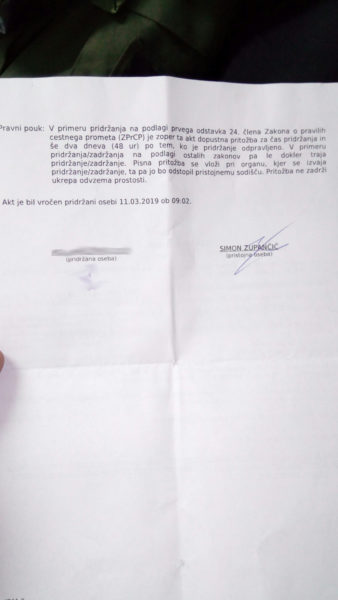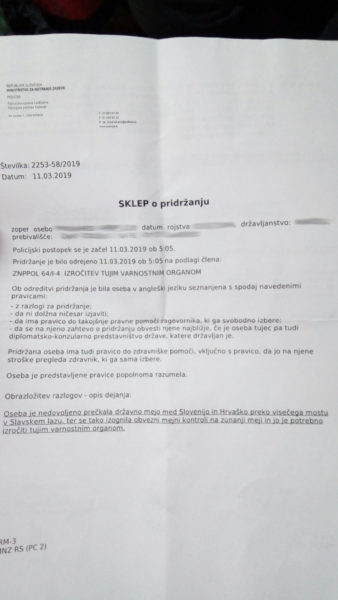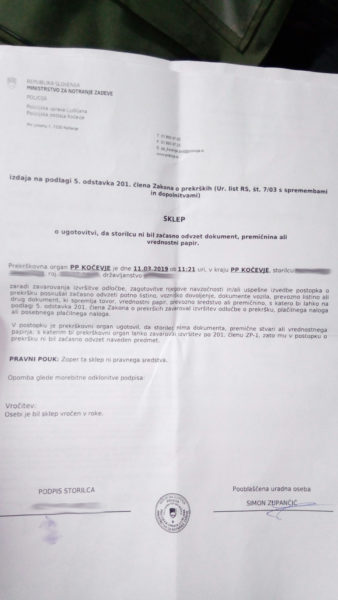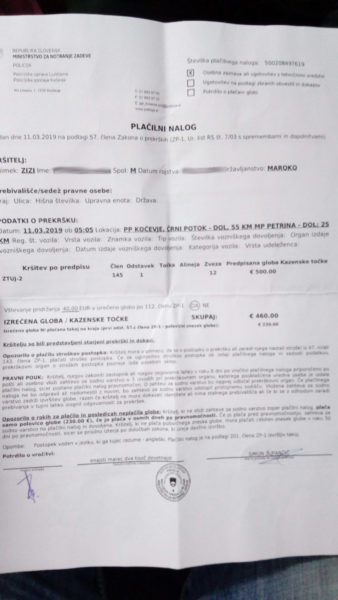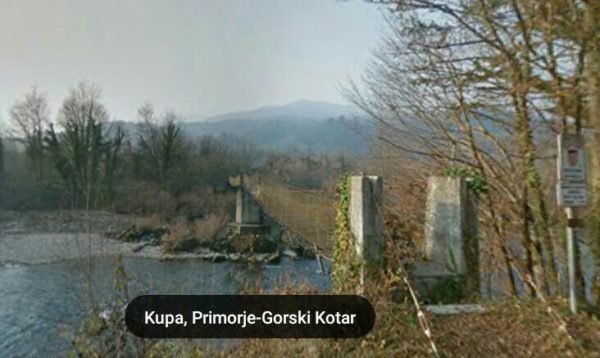The group of five people-on-the-move from Morocco was chain pushed-back from Slovenia to Croatia, then from Croatia to Bosnia.
The Group of five men started in Bihać (BIH) on March 4, 2019, and after they crossed the Croatian border, they continued walking for eight days through Croatia towards the Slovenian border.
On March 11, they arrived at an old bridge at the Kupa border river at an old bridge. After they crossed the bridge, a group of three male and one female Slovenian officer was waiting at the other side in Slavski Laz next to a steel door and a fence. The officers asked them how many people they were and if there were more coming.
Then the officers entered their police car, a Dacia Duster, and made phone calls. After 10 minutes, they opened the steel gate and the people on the move stepped inside. The officers searched their bodies and asked them if they carried knives or weapons with them or anything else that could harm them.
Afterwards, around 5 am, they brought them with a van to the Kočevje police station. There they asked for asylum and the officers replied:
“Yes, yes okay.”
Then they put them into a room with two toilets, video cameras on the ceiling and a wall with an interrogation glass, where you can only look through from one side, the respondent recounted. The officers brought them food and took their phones. According to the respondent, the group of five spend one night in the room because they couldn’t push them back earlier due to a lot of snow outside.
The next day, two people with white suits, blue gloves and masks interrogated them. They asked them why they were there, where they were from and more similar questions. They only took the fingerprint of the index finger of the right hand, told them to look in the camera without asking questions and took photos of everyone.
Then an officer in uniform, carrying weapons on his belt gave them about eight documents in Slovenian, which they had to sign without translation. They also took their money and brought them back to the interrogation room. There, one individual requested one more time for an asylum procedure and one officer replied only that it takes time.
One Iraqi minor was brought to the station and interrogated with the help of one of the five individuals. He arrived together with a social worker with red hair from an organization which takes care of minors. There was also a female officer woman (R. TROPIĆ) sitting at a desk. When one individual asked for asylum again, she just said, that it is going to happen later. The respondent recounted that the female officer lied to the social worker by telling her that after one night they would be sent to a camp where they would be able to apply for asylum. Also, one person asked to call his family or a lawyer, but she refused and told him, that he could call them later in the camp.
Afterwards, they brought them papers declaring a penalty fine of about €500 for illegally crossing the border. All of them signed it, because the thought it is important to have at least this one paper. The respondent reported how the police officer lied again to the social worker and the asylum-seekers and assured that they would be brought to the camp.
In the next morning at 10 am on March 12, after about 30 hours, the officers brought them to the van and said:
“Don’t worry, everything is going to be fine.”
When they got off the van again, they realized that they had been brought to the border checkpoint Petrina, where the Croatian authorities already waited for them. One individual asked a female Croatian officer, why they were at this location and that they want asylum. She was shocked by the question and asked the Slovenian officers why they brought the group to the border, but never explained it to the asylum-seekers.
“You could tell on their faces, that they were doing something illegal.”
The Slovenian officers handed over some documents to the Croatian authorities, as well as the phones and the money. After that, the Croatian officers took some new papers out of the car, wrote the names of the five of them down and took photos, while they were told to hold the papers in front of their chests. They also filled in a form for every individual with the questions:
“Where are you from? How long did you walk? How many people? Where did you start?”
Then, they forced them to sign the papers, but never handed them any of those documents out. In the end the five individuals had to enter the van again and were driven three hours near Glinica (the estimated location is shown on the map). One individual had terrible open wounds on the feet from walking. In Slovenia, a doctor just put some bandages on them and told him not to walk that much. But at 3 am, they were forced to walk 15 km back to Velika Kladuša.
“In Slovenia I thought I finally made it, that I get asylum and it is a secure place. I was really shocked, when you mention the name of the police station in Kočevje I am still shaking inside. Because the way the police acted really, really left me with psychological scars. Even the police officers in the white suit and the blue gloves, when they were talking to me, asked me why I choose Slovenia. I was heading there because I believed in Slovenian democracy and the very advanced legal system with human rights protection. So I wanted to establish my life with my family here in Slovenia. But I was shocked how police can zigzag the law, how they bullshit people to sign paper without translation and lie to your face, it is really shocking. How can you say no, if someone with weapons on his waist comes to you and tells you to sign this paper? I was disappointed by such lies and deception from the police. Why did they keep some documents from us?”
The respondent received three of all the documents he signed, which could be archived:
1. Document: Order of detention
It says, this person, who was detained, got an explanation in English (not the mother language) about:
-
the reasons why he was detained
-
that he is not obliged to give any information
-
that he has the right to medical treatment
-
that he has the right to have a legal representative, that he can choose by himself
-
that the person understood what was communicated to him.
The individual has crossed the state border between Slovenia and Croatia in an illegal way (without permission) by passing over a hanging bridge in Slavski Laz and has in doing so avoided mandatory border control at the external border. It is because of this reason that the individual must be extradited (=pushed back) to foreign (Croatian) authorities.
2. Document:
The police has the right, to take away his identity documents (like passport, drivers license, ID-card etc.) to find out his identity. But in this case he didn’t have any of these, so they couldn’t do it.
3. Document:
A fine for crossing the border illegally of €500. But because he was four hours in detention, he was given a compensation of €10 per hour so the fine was reduced to €460.
These documents make the practice of the Slovenian police clear:
-
There was no translation despite mentioned in the documents
-
They did not tell them about their rights, not even in English
-
They wrote that it was explained to the person in English, which is NOT the mother language and therefore not sufficient
→ Anyway in this specific case, the content of the signed papers wasn’t expressed at all.
-
They lied to the asylum-seekers and social worker about the asylum request
-
They did not let them call any legal representative or family members
-
They gave them compensation for four hours (to reduce the fine) but actually detained them for about 30 hours
-
They kept some documents from them
-
They forced them to sign documents which they weren’t able to understand
-
They justified the push-back with the illegal border crossing of the person
-
They cooperated with the Croatian police concerning the push-back
Coordinates of Locations:
Old bridge over Kupa-River (Slovenian/Croatian border, near Slavski Laz): 45.4785, 14.9101
Kočevje police station: 45.6459645, 14.8528260
Petrina: 45.4640, 14.8528
Glinica: 45.2026040, 15.9407112
